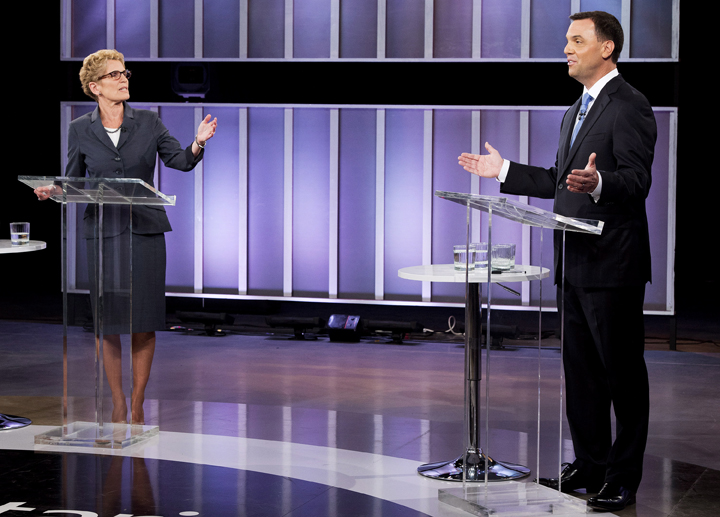TORONTO – The leaders of Ontario’s three main political parties duked it out in a debate Tuesday just nine days before voters go to the polls.

They spent most of the time attacking each other and a lot less touting their own ideas.
It was easy to get confused in the ruckus. We kept track of some of the statements that didn’t quite pass the smell test.
Hudak’s 10 per cent of public sector
Note (June 05): The Progressive Conservative Party provided new data from two different Statistics Canada data sets to arrive at their claim of 100,000 employees. They compare the number of provincial employees from August 2009 to January 2014, which is an increase of 102,137. However, if you compare January 2009 to January 2014 that number shrinks to 73,377.
Wynne’s $29 billion for transit
Kathleen Wynne said Tuesday her Liberals will spend $29 billion on transit over ten years.
To do this they would dedicate existing funds from HOV toll lanes and the gas tax, but they haven’t said where they’d cut that $750 million a year.
They say other taxes, including tax hikes on the province’s richest, on smokers and aviation fuel would go to replacing that $750 million.
Watch: Ontario Election Debate: Wynne, Horwath debate transit in Ontario
Horwath’s plan is the Liberals’ plan.
Andrea Horwath tried to differentiate her transit plan from the Liberals plan – however – it’s not that much different.
In fact, it is the Liberals plan plus another $250 million, and we don’t know where that money comes from. Wynne took Horwath to task during the debate for stealing her plan.
She also says she’d pay for transit expansion, including the Downtown Relief Line and Union-Pearson Express, with a tax hike for business – “encouraging businesses to engage” in transit expansion is how she’s put it. No hard numbers on that so far. And she slammed plans for diesel rather than electric trains.
Does Ontario have the leanest provincial government in Canada?
Yes it does. Ontario spends far less per capita on public sector employees than every other province in Canada.
Hudak tried to suggest that Ontario didn’t have the leanest government in Canada by bringing up the levels of debt. Wynne quickly pointed out that has nothing to do with what’s considered a “lean government.”
Tim Hudak vows to resign if ‘Million Jobs Plan’ doesn’t work
Tim Hudak attempted to lay down a game-changer by promising to resign if his plan doesn’t create a million jobs.
But his plan has a timeline of eight years. That’s at least two elections – possibly many, many more if he doesn’t win a majority.
Horwath tells voters ‘you don’t have to choose between bad ethics, and bad math’
Both Horwath and Wynne went after Hudak’s supposed problems with math, which was awkward as he talked about how his dad raised him on math problems. In his Million Jobs Plan, the Progressive conservatives confused person years with jobs. As an example, a job that last four years would equal four jobs.
“There’s no doubt that Hudak’s million jobs plan has a million math mistakes in it,” Horwath said.
Hudak defended it, saying it would create lots of jobs, and promised to resign if it doesn’t work.
$4-billion “cut” from Liberals’ Toronto transit plan
While they were dredging up each others’ records, both Horwath and Hudak referenced the $4-billion the province “cut from its Transit City plan for Toronto in 2010. But while the move enraged then-Mayor David Miller and transit advocates, it was actually $4-billion postponed – not cut entirely.
Who has a jobs plan?
All three candidates trashed each others’ plans to create jobs. But the truth is, job creation’s far more complex than lowering corporate taxes or giving companies targeted grants – especially given the needs of certain high-unemployment groups in Ontario.
Taking the HST off hydro
Horwath touted her plan to make energy cheaper by removing the provincial HST portion of it. But she’d need buy-in from the federal government to do that.


Comments